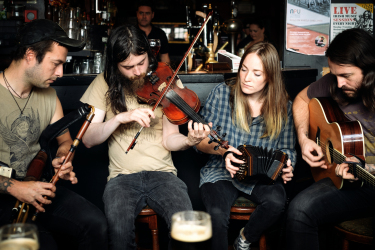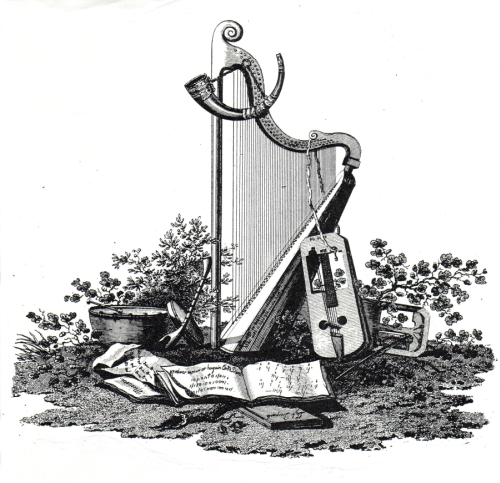
Lynched: Ian on uilleann pipes, Cormac on fiddle, Radie on concertina and Daragh on guitar. Photo: Brian Flanagan
LYNCHED: Roots Unearthed, Lefel 3, St David’s Hall, Cardiff, September 20, 2016
It was the early 2000s, and Dublin brothers Ian and Daragh Lynch hit upon the plan of forming an experimental psychedelic folk-punk duo. That duo has metamorphosed into Lynched, the spellbinding and alluringly mesmerising young quartet who are fiercely proud of their traditions which are rooted in Ireland’s capital city; and the crowded audience clapped, cheered, sang chorus ditties and were with them all the way. The Irish folk industry is firing on all cylinders, is totally cooking on gas and is rocketing in popularity in these latter days, but Lynched are a breath of fresh air. Their music is rough and ready, but it’s inspiring, exciting and stuffed brim-full of traveller culture, mysterious ballads, music-hall songs and their own writing, and it’s liberally influenced with city bar tune sessions. The punters queued up to buy their latest debut CD, Cold Old Fire, and it’s continually been playing loud and long on the FolkWales Online Magazine office and on the road ever since – it truly is a magnificent album, and it allows Lynched to deliver those unique, spine-tingling four-part harmonies which are part of this band’s trademark.
Anyway, back to the story: Ian and Daragh began to attend sessions around Dublin as their interest in traditional music and song grew, and concertina player and whistler Radie Peat and fiddler Cormac Mac Diarmuida soon became friends. Ian completed his folklore masters’ degree and started work in the Irish Traditional Music Archive, and the rare chance arose for him to record in the ITMA studio with in-house technician, friend and colleague Danny Diamond. The brothers asked Cormac and Radie to provide some backing vocals and instrumentation on “one or two songs” – and Lynched evolved out of that. The group quickly became a dedicated four-piece, gaining experience and confidence as they played together at the Grand Folk Club gigs, which they hosted monthly. They also applied for the Irish Arts Council’s 2013 Deis Recording Award, and Cold Old Fire was the successful result.
Lynched started the set with ‘Henry My Son’, a gritty Dublin version of the fatal-dish ballad ‘Lord Randall’, in which poisoned beans are substituted for eels and eel-broth. The late collector and singer Frank Harte said that the Dublin man could not accept the beautiful, slow, classical form, but instead preferred these inelegant verses. Ian’s harsh voice was pure gravel in this slowed-down form, and it painted vivid colours of city street-life, as opposed to a pastoral folk-song. ‘Daffodil Mulligan’ was written by Dublin variety-hall songwriter Harry Donovan and recorded by the popular Dublin stage entertainer Jimmy O’Dea in 1938; we all roared the very short chorus: “Fresh Fish!” ‘Drinking Song’ originated from The Tomb, a story written by Howard Phillips Lovecraft, who died in 1937 and wrote horror stories and pseudo-folk songs (including ‘Vandy Vandy,’ performed by a number of folk singers, including the American Debby McClatchy and Maggie Holland.) ‘Rosie Riley’ painted a picture of the Horse Fair in the East Galway town of Ballinasloe; it was a sheer delight to hear Ian and Daragh pronounce “arrums”, as only a Dublin street-singer can.
Radie startled and held the audience, singing in her distinctive, strident voice ‘The Old Man From Over The Sea’, which she learned from a Frankie Armstrong recording; she was genuinely surprised and delighted when someone informed her that Frankie lives with her partner in Cardiff. The song segued into a tingling session beween her and Cormac comprising the US bluegrass reels ‘Kitchen Girl’ and ‘Angeline The Baker’. Ian and Daragh plunged into the traveller song ‘Father Had A Knife’, by the Anglo-Romani Jasper Derby Smith, which blended the Cork City First World War song ‘Salonika’, made famous by Cork native Jimmy Crowley, who noted down the verses from a Mrs Ronayne. Salonika is the Greek city of Thessaloniki, home to a British military base in wartime, and the song told the story of a ‘Sepera’, a wife who was paid separation money when her husband went away to fight with the British Army. The eerie ballad ‘The Tri-Coloured House’, cousin to ‘The Elfin Knight’ and the Martin Carthy-honed ‘Scarborough Fair’, was recorded from the settled traveller Mrs Mary Kate McDonagh of Co. Leitrim; and ‘Cold Old Fire’, written by Daragh and Cian Lawless, is an accurate pointer to an economically-depressed Dublin and a bad winter.
Ian’s uilleann pipes just seem to fit together with Radie’s weird and unearthly concertina and bayan (a large Russian accordion), Cormac’s fine and gutsy fiddle and Daragh’s sparse guitar – in fact, Lynched create their own special magic, passionate and utterly beguiling, anarchic yet soldered to the band’s arrangements, classed as their own. Something tells me that Lynched will return triumphantly to Lefel 3 – after all, hundreds of impressed and satisfied customers just cannot be wrong.
Mick Tems
